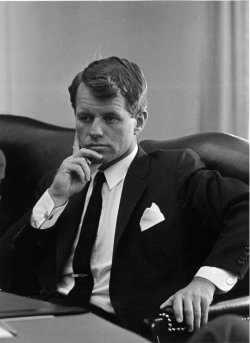- Sep 2, 2008
- 33,178
- 3,055
- 48

42 years ago today, the death of Robert F. Kennedy occurred in Los Angeles, California shortly after his victory in the California Primary.
Robert F. Kennedy - Wikipedia, the free encyclopedia
Some landmarks in his life:
During his tenure as Attorney General, he undertook the most energetic and persistent desegregation of the administration that Capitol Hill had ever experienced. He demanded that every area of government begin recruiting realistic levels of black and other ethnic workers, going so far as to criticize Vice President Lyndon B. Johnson for his failure to desegregate his own office staff.
As Attorney General, Kennedy pursued a relentless crusade against organized crime and the mafia, sometimes disagreeing on strategy with J. Edgar Hoover, Director of the Federal Bureau of Investigation (FBI). Convictions against organized-crime figures rose by 800 percent during his term.[10
Asked in an interview in May 1962, "What do you see as the big problem ahead for you, is it Crime or Internal Security?" Robert Kennedy replied, "Civil Rights."[16] The President came to share his brother's sense of urgency on the matters at hand to such an extent that it was at the Attorney General's insistence that he made his famous address to the nation.[8]
King proceeded to berate Kennedy for "allowing the situation to continue". King later publicly thanked Robert Kennedy for his commanding of the force dispatched to break up an attack that might otherwise have ended King's life. The relationship between the two men was to undergo great change over the years that they would know each otherfrom a position of mutual suspicion to one of shared aspirations. For King, Robert Kennedy initially represented the "softly softly" approach that in former years had disabled the movement of blacks against oppression in the U.S. For Robert Kennedy, King initially represented what was then considered the unrealistic militancy that many in the white-liberal camp had regarded as the cause of so little governmental progress.
In September 1962, he sent U.S. Marshals to Oxford, Mississippi, to enforce a federal court order allowing the admittance of the first African American student, James Meredith, to the University of Mississippi. Kennedy had hoped that legal means, along with the escort of U.S. Marshals, would be enough to force the Governor to allow the school admission.
Robert Kennedy saw voting as the key to racial justice, and collaborated with Presidents Kennedy and Johnson to create the landmark Civil Rights Act of 1964, which helped bring an end to Jim Crow laws.
After the assassination of President Kennedy, Robert Kennedy undertook a 1966 tour of South Africa in which he championed the cause of the anti-Apartheid movement. The tour was greeted with international praise at a time when few politicians dared to entangle themselves in the politics of South Africa. Kennedy spoke out against the oppression of the native population and was welcomed by the black population as though a visiting head of state.
In 1968, Kennedy expressed his strong willingness to support a bill then under consideration for the abolition of the death penalty.[26]
Kennedy stood on a platform of racial and economic justice, non-aggression in foreign policy, decentralization of power and social improvement. A crucial element to his campaign was an engagement with the young, whom he identified as being the future of a reinvigorated American society based on partnership and equality. A good idea of his proposals come from the following extract of a speech given at the University of Kansas.
"If we believe that we, as Americans, are bound together by a common concern for each other, then an urgent national priority is upon us. We must begin to end the disgrace of this other America. And this is one of the great tasks of leadership for us, as individuals and citizens this year. But even if we act to erase material poverty, there is another greater task, it is to confront the poverty of satisfaction - purpose and dignity - that afflicts us all. Too much and for too long, we seemed to have surrendered personal excellence and community values in the mere accumulation of material things. Our Gross National Product, now, is over $800 billion dollars a year, but that Gross National Product - if we judge the United States of America by that - that Gross National Product counts air pollution and cigarette advertising, and ambulances to clear our highways of carnage. It counts special locks for our doors and the jails for the people who break them. It counts the destruction of the redwood and the loss of our natural wonder in chaotic sprawl. It counts napalm and counts nuclear warheads and armored cars for the police to fight the riots in our cities. It counts Whitman's rifle and Speck's knife, and the television programs which glorify violence in order to sell toys to our children. Yet the gross national product does not allow for the health of our children, the quality of their education or the joy of their play. It does not include the beauty of our poetry or the strength of our marriages, the intelligence of our public debate or the integrity of our public officials. It measures neither our wit nor our courage, neither our wisdom nor our learning, neither our compassion nor our devotion to our country, it measures everything in short, except that which makes life worthwhile. And it can tell us everything about America except why we are proud that we are Americans.[37]
This is one of the more famous eulogies perhaps in history, that of which is spoken by his brother Ted.
[ame=http://www.youtube.com/watch?v=p9JTYnMpRyg]YouTube - Eulogy of Bobby Kennedy[/ame]

